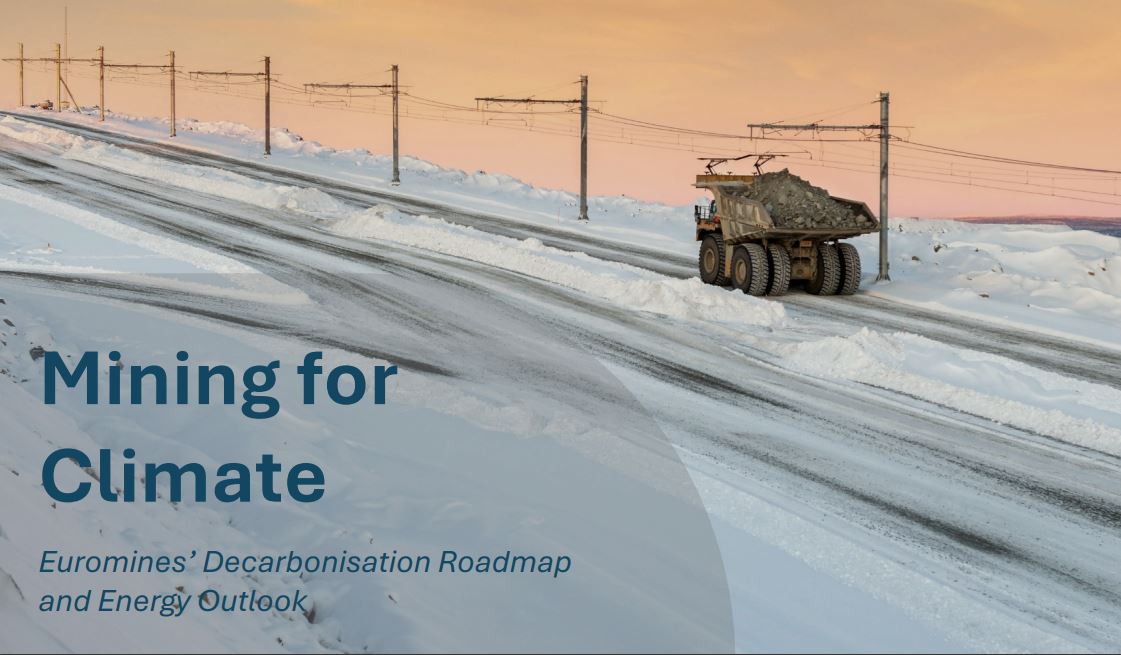The EU is home to the most sustainable mining sector in the world. The industry has not only transformed its practices but also serves as a vital enabler of the net-zero transition by ensuring the availability of the raw materials Europe needs for a greener, cleaner, and more competitive future.
This was the central message of a recent dinner at the European Parliament in Strasbourg that gathered together MEPs and industry leaders. Convened by Euromines, the recognised representative of the European metals and minerals mining industry, the event offered an opportunity to reflect on progress to date and articulate an ambitious vision for the sector's future.
Greek MEP Professor Yannis Maniatis, who co-hosted the event, reminded attendees that mining was important not simply as a standalone industry. It is, he said, also a critical facilitator in achieving Europe’s wider environmental ambitions.
“We simply cannot have a green transition without raw materials,” he explained. “We cannot have smartphones, computers, photovoltaic wind farms, or batteries without the mining sector. The clean transition starts in the mines.”
Without raw materials, we cannot have smartphones, computers, photovoltaic wind farms, or batteries. The clean transition starts in the mines
MEP Yannis Maniatis
Fellow co-host MEP Radan Kanev echoed this sentiment, calling for stronger collaboration between policymakers and industry to unlock the sector’s enormous potential. He urged European policymakers to move beyond imposing new demands and regulations, advocating instead for a cooperative approach to develop effective solutions.
MEP Kanev told guests at the event that the current lack of clarity on the roadmap for a cleaner industrial future provides an opportunity for the sector.
“We don't know what the ‘Clean Industrial Deal’ actually is,” MEP Kanev explained to guests. “This could be seen as a problem, but I view it more as an opportunity. Because it means that we can shape it together.”
The European mining sector is already stepping up, providing data and insights to support effective policymaking. During the event, Euromines unveiled Mining for Climate: Decarbonisation Roadmap and Energy Outlook, a bold vision to achieve net-zero emissions while maintaining the sector’s integral role in Europe’s industrial ecosystem.
“It is 30-40 years since we started to export our mining industry and started to import metals and minerals from other parts of the world,” Jan Moström, Group President and CEO of LKAB, and President of Euromines told the event. “Europe currently produces 3% of the world's metals and minerals but utilises 30%. How can we change that?”
The new report addresses this central challenge, outlining opportunities, case studies, and policy asks as the industry seeks closer alignment with Europe’s climate neutrality ambitions.
One of the report’s authors, Dr Tomas Wyns, a senior researcher at Vrije Universiteit Brussel, highlighted the industry’s world-leading innovation in advancing the net-zero agenda.
“Europe’s mining industry is a global leader in technological sophistication and commitment to decarbonisation,” he told attendees. “Mining companies are suppliers of the critical materials essential for modern life, such as copper, nickel, magnesia, and tungsten, making them critical players in achieving the EU’s Green Deal targets.”
The roadmap identifies key elements crucial to accelerating the sector’s progress toward carbon neutrality. It focuses on electrification, alternative fuels, digital transformation, and carbon capture technologies, aiming to deliver fully decarbonised operations by mid-century.
However, achieving that vision is far from straightforward. In a global marketplace for metals and minerals, high European energy costs could undermine the competitiveness of electrified mining operations compared to fossil fuel-powered processes in other regions.
“Electricity prices are absolutely critical,” Wyns explained. “If they remain three or four times higher than outside the EU, then companies may not make the investments needed.”
Europe currently produces 3% of the world's metals and minerals but utilises 30%. How can we change that?
Jan Moström, President of Euromines
It is a point echoed by MEP Professor Maniatis, who called for the full implementation of the recent Draghi Report on European competitiveness. That landmark publication identifies Europe’s high energy prices as a key factor contributing to the EU’s competitiveness gap.
Thomas Drnek, representing both the University of Leoben and RHI Magnesita, an international leader in refractory products, shares Wyn’s view that energy prices are a major challenge for the transition to a lower carbon future.
Drnek explained that RHI Magnesita has already slashed CO2 emissions by 1 million tons since 2018 and is currently developing an innovative plant that will convert captured CO2 into usable materials for construction.
However, Drnek cautioned that if such solutions are to be successfully scaled then there must be a regulatory framework that understands the challenges of economic viability.
“For captured CO2 to be used in construction materials or other products, there can be no additional costs or regulatory hurdles,” Drnek explained. “Otherwise, it will simply not make sense commercially.”
That plea for nuanced regulation that understands the commercial and operational challenges faced by businesses was echoed by leaders from across Europe’s mining industry. Absorbing much higher energy costs within the margins of global asset prices has the potential to undermine the viability of operations. That would potentially lead to overreliance on imports for critical materials, such as those needed to store or transport electricity, reducing Europe’s resilience in a world of increasingly unpredictable supply chains.
The Euromines roadmap offers a potential solution to those challenges. By prioritising electrification, carbon capture, and digitalisation, the plan seeks to align Europe’s mining industry with the EU’s climate goals, positioning it as a cornerstone of the continent’s industrial strategy.
It is a contribution that some European legislators have already warmly welcomed.
“This new Euromines study offers valuable insights and potential solutions,” MEP Maniatis concluded. “ With this as a guiding document, we can transition to a competitive and green mining industry.”
Find out more with Euromines’ roadmap for a clean transition report below
Sign up to The Parliament's weekly newsletter
Every Friday our editorial team goes behind the headlines to offer insight and analysis on the key stories driving the EU agenda. Subscribe for free here.